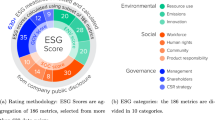Abstract
Sustainable and responsible finance incorporates Environmental, Social, and Governance (ESG) principles into business decisions and investment strategies. In recent years, investors have rushed to Sustainable and Responsible Investments in response to growing concerns about the risks of climate change. Asset managers look for some assessment of sustainability for guidance and benchmarking, for instance, $30 trillion of assets are invested using some ESG ratings. Several studies argue that good ESG ratings helped to prop up stock returns during the 2008 Global Financial Crisis (Lins et al. J Finance 72(4):1785–1824, 2017). The ESG score represents a benchmark of disclosures on public and private firms, it is based on different characteristics which are not directly related to the financial performance (Harvard Law School Forum on Corporate Governance, ESG reports and ratings:what they are, why they matter. https://corpgov.law.harvard.edu/2017/07/27/esg-reports-and-ratings-what-they-are-why-they-matter/, 2017). The role of ESG ratings and their reliability have been widely discussed (Berg et al. Aggregate confusion: the divergence of ESG ratings, MIT Sloan Research Paper No. 5822-19, 2019). Sustainable investment professionals are unsatisfied with publicly traded companies’ climate-related disclosure. This negative sentiment is particularly strong in the USA, and within asset managers who do not believe that markets are consistently and correctly pricing climate risks into company and sector valuations. We believe that ESG ratings, when available, still affect business and finance strategies and may represent a crucial element in the company’s fundraising process and on shares returns. We aim to assess how structural data as balance sheet items and income statements items for traded companies affect ESG scores. Using the Bloomberg ESG scores, we investigate the role of structural variables adopting a machine learning approach, in particular, the Random Forest algorithm. We use balance sheet data for a sample of the constituents of the Euro Stoxx 600 index, referred to the last decade, and investigate how these explain the ESG Bloomberg ratings. We find that financial statements items represent a powerful tool to explain the ESG score.








Similar content being viewed by others
Notes
This index measures the ability of Sustainability Accounting Standards Board (SASB) sectors to impact Sustainable Development Goals (SDGs) in general.
The algorithm’s parameters are set as follows: mtry=5,5,5 and nodesize=1,1,1 for \(Y_E\), \(Y_S\) and \(Y_G\), respectively.
References
Alberg, J., Lipton, Z.: Improving factor-based quantitative investing by forecasting company fundamentals. Working paper, Cornell University. Available at arxiv:1711.04837 (2017)
Angel, J., Rivoli, P.: Does ethical investing impose a cost upon the firm? A theoretical perspective. J. Invest. 6, 57–61 (1997)
Antolín-López, R., Delgado-Ceballos, J., Montiel, I.: Deconstructing corporate sustainability: a comparison of different stakeholder metrics. J. Clean. Prod. 136, 5–17 (2016)
Batres-Estrada, G.: Deep learning for multivariate financial time series. Master’s thesis, KTH Royal Institute of Technology. https://www.math.kth.se/matstat/seminarier/reports/M-exjobb15/150612a.pdf (2015)
Bauer, R., Koedijk, K., Otten, R.: International evidence on ethical mutual fund performance and investment style. J. Bank. Finance 29(7), 1751–1767 (2005)
Belghitar, Y., Clark, E., Deshmukh, N.: Does it pay to be ethical? Evidence from the FTSE4Good. J. Bank. Finance 47, 54–62 (2014)
Bello, Z.Y.: Socially responsible investing and portfolio diversification. J. Financ. Res. 28(1), 41–57 (2005)
Benabou, R., Tirole, J.: Individual and corporate social responsibility. Economica 77,(2010). https://doi.org/10.1111/j.1468-0335.2009.00843.x
Berg, F., Koelbel, J.F., Rigobon, R.: Aggregate confusion: the divergence of ESG ratings. MIT Sloan Research Paper No., 5822–19 (2019)
Betti, G., Consolandi, C., Eccles, R.G.: The relationship between investor materiality nd the sustainable development goals: a methodological framework. Sustainability 10, 2248 (2018). https://doi.org/10.3390/su10072248
Boiral, O., Paillé, P.: Organizational citizenship behaviour for the environment: measurement and validation. J. Bus. Ethics 109(4), 431–445 (2012)
Bowen, H.R.: Social responsibilities of the businessman. Ethics Econ. Soc. New York, Harper (1953)
Breiman, L., Friedman, J. et al.: Classification and regression trees (1984)
Breiman, L.: Bagging predictors. Mach. Learn. 24(2), 123–140 (1996)
Breiman, L.: Random forests. Mach. Learn. 45(1), 5–32 (2001)
Carroll, A.B.: Corporate social responsibility. Bus. Soc. 38(3), 268–295 (1999)
Chatterji, A.K., Durand, R., Levine, D.I., Touboul, S.: Do ratings of firms converge? Implications for managers, investors and strategy researchers. Strategic Manag. J. 37(8), 1597–1614 (2016)
Chen Y., Deleon A.: Financial quality metrics and ESG factor interactions in equity markets. J. Impact ESG Invest., Winter 2020, 1(2), 7–15. (2020). https://doi.org/10.3905/jesg.2020.1.005
Cohen, B., Winn, M.I.: Market imperfections, opportunity and sustainable entrepeneurship. J. Bus. Ventuar. 22, 29–49 (2007)
Derwall, J., Guenster, N., Bauer, R., Koedijk, K.: The eco-efficiency premium puzzle. Financ. Anal. J. 61(2), 51–63 (2005)
Douglas, E., Van Holt, T., Whelan, T.: Responsible investing: guide to ESG data providers and relevant trends. J. Environ. Invest. 8(1), 92–114 (2017)
Drempetic, S., Klein, C., Zwergel, B.: The influence of firm size on the ESG score: corporate sustainability ratings under review. J. Bus. Ethics 167, 333–360 (2020)
European Banking Federation (EBF) (2021). REBF response to the discussion paper on management and supervision of ESG risks for credit institutions and investment firms
European Investment Bank (2018). Sustainability reporting disclosures in accordance with the GRI standards. https://www.eib.org/attachments/documents/gri_standards_2018_en.pdf
Garcia, F., González-Bueno, J., Guijarro, F., Oliver, J.: Forecasting the environmental, social, and governance rating of firms by using corporate financial performance variables: a rough set approach. Sustainability 12, 3324 (2020)
Gu, S., Kelly, B., Xiu, D.: Empirical asset pricing via machine learning. Rev. Financ. Stud. 33, 2223–2273 (2020)
Hachenberg, B., Schiereck, D.: Are green bonds priced differently from conventional bonds? J. Asset Manag. 19(6), 371–383 (2018)
Hamilton, S., Jo, H., Statman, M.: Doing well while doing good? The investment performance of socially responsible mutual funds. Financ. Anal. J. 49(6), 62–66 (1993)
Hartzmark, S.M., Sussman, A.B.: Do investors value sustainability? A natural experiment examining ranking and fund flows. J. Finance 74(6), 2789–2837 (2019)
Harvard Law School Forum on Corporate Governance (2017). ESG reports and ratings: what they are, why they matter. https://corpgov.law.harvard.edu/2017/07/27/esg-reports-and-ratings-what-they-are-why-they-matter/
James, G., Witten, D., Hastie, T., Tibshirani, R.: An introduction to statistical learning: with applications. In R. Springer Texts in Statistics. ISBN 10: 1461471370. (2017)
Jewell, J., Livingston, M.: Split ratings, bond yields, and underwriter spreads. J. Financ. Res. 21(2), 185–204 (1998)
Joliet, R., Titova, Y.: Equity SRI funds vacillate between ethics and money: an analysis of the funds stock holding decisions. J. Bank. Finance 97, 70–86 (2018)
Kreander, N., Gray, R., Power, D., Sinclair, C.: Evaluating the performance of ethical and non-ethical funds: a matched pair analysis. J. Bus. Finance Account. 32(7/8), 1465–1493 (2005)
Li, F., Polychronopoulos, A.: What a difference an ESG ratings provider makes!, research affiliates. https://www.researchaffiliates.com/en_us/publications/articles/what-a-difference-an-esg-ratings-provider-makes.html(2020)
Liaw, A.: Package randomforest. Available on line at https://cran.r-project.org/web/packages/randomForest/randomForest.pdf (2018)
Limkriangkrai, M., Koh, S., Durand, R.B.: Environmental, social, and governance (ESG) profiles, stock returns, and financial policy: Australian evidence. Int. Rev. Finance 17(3), 461–471 (2017)
Lin, W.L., Law, S.H., Ho, J.A., Sambasivan, M.: The causality direction of the corporate social responsibility—corporate financial performance Nexus: application of panel vector autoregression approach. North Am. J. Econ. Finance 48, 401–418 (2019)
Lins, K.V., Servaes, H., Tamayo, A.: Social capital, trust, and firm performance: the value of corporate social responsibility during the financial crisis. J. Finance 72(4), 1785–1824 (2017)
Loh, W.Y.: Classification and regression trees. Data Mining Knowl. Dis., Wiley Interdisciplinary Reviews (2011)
Mahjoub, L.B., Khamoussi, H.: Environmental and social policy and earning persistence. Bus. Strategy Environ. 22(3). (2012) https://doi.org/10.1002/bse.1739
Mahler, D., Barker, J., Belsand, L., Schulz, O.: Green Winners: The Performance of Sustainability Focused Companies During the Financial Crisis. Technical report. A.T, Kearney (2009)
Makni, R., Francoeur, C., Bellavance, F.: Causality between corporate social performance and financial performance: evidence from Canadian firms. J. Bus. Ethics 89(3), 409 (2008)
Moritz, B., Zimmermann, T.: Tree-based conditional portfolio sorts: the relation between past and future stock returns. Working Paper, Ludwig Maximilian University of Munich (2016)
Nakao, y., Amano, A., Matsumura, K., Genba, K., Nakano, M.: Relationship between environmental performance and financial performance: an empirical analysis of Japanese corporations. Bus. Strategy Environ. 16, 106–118 (2007)
Novy-Marx, R.: The other side of value: the gross profitability premium. J. Financ. Econ. 108, 1–28 (2013)
Pedersen, H.L., Fitzgibbons, S., Pomorski, L.: Responsible investing: the ESG-efficient frontier. J. Financ. Econ. (2020). https://doi.org/10.1016/j.jfineco.2020.11.001
Petitjean, M.: Eco-friendly policies and financial performance: Was the financial crisis a game changer for large us companies? Energy Econ. 80, 502–511 (2019)
Principles for Responsible Investment (2016). A practical guide to ESG integration for equity investing. United Nations. Available on line at: https://www.unpri.org/listed-equity/a-practical-guide-to-esg-integration-for-equity-investing/10.article
Quinlan, J.R.: Induction of decision trees. Mach. Learn. 1, 81–106 (1986)
Renneboog, L., Ter Horst, J., Zhang, C.: Socially responsible investments: institutional aspects, performance, and investor behavior. J. Bank. Finance 32(9), 1723–1742 (2008)
Searcy, C., Elkhawas, D.: Corporate sustainability ratings: an investigation into how corporations use the Dow Jones Sustainability Index. J. Clean. Prod. 35, 79–92 (2012)
Simpson, W.G., Kohers, T.: The link between corporate social and financial performance: evidence from the banking industry. J. Bus. Ethics 35, 97–109 (2002)
S&P Global (2020). https://www.spglobal.com/en/research-insights/articles/what-is-the-difference-between-esg-investing-and-socially-responsible-investing, February 25, 2020
Statman, M.: Socially responsible mutual funds. Financ. Anal. J. 56(3), 30–39 (2000)
Takeuchi, L., Lee, Y.Y.A.: Applying deep learning to enhance momentum trading strategies in stocks. Working paper, Stanford University. http://cs229.stanford.edu/proj2013/TakeuchiLee-ApplyingDeepLearningToEnhanceMomentumTradingStrategiesInStocks.pdf (2013)
Trucost and Mercer.: Carbon counts: assessing the carbon exposure of Canadian Institutional Investment Portfolios. Posted: Sept 1, 2010 (2010)
Utz, S., Wimmer, M.: Are they any good at all? A financial and ethical analysis of socially responsible mutual funds. J. Asset Manag. 15(1), 72–82 (2014)
Van de Velde, E., Vermeir, W., Corten, F.: Corporate social responsibility and financial performance. Corp. Governan. 5, 129–138 (2005)
Wang, S., Luo, Y.: Signal processing: the rise of the machines. Deutsche Bank Quantitative Strategy (5 June) (2012)
Wang, S., Luo, Y.: Signal processing: the rise of the machines III. Deutsche Bank Quantitative Strategy (2014)
WBCSD (2019). ESG Disclosure Handbook, World Business Council for Sustainable Development. Available on line at https://docs.wbcsd.org/2019/04/ESG_Disclosure_Handbook.pdf
Weber, O.: Measuring the impact of socially responsible investing. Working paper. Available at SSRN: http://dx.doi.org/10.2139/ssrn.2217784 (2013)
Weber, O., Mansfeld, M., Schirrmann, E.: The financial performance of SRI funds between 2002 and 2009 (June 25, 2010). Available at https://doi.org/10.2139/ssrn.1630502 (2010)
Winn, M., Pinkse, J., Illge, L.: Case studies on trade-offs in corporate sustainability. Corp. Soc. Responsib. Environ. Mgmt. 19, 63–68 (2012). https://doi.org/10.1002/csr.293
Wong, C., Petroy, E.: Rate the raters 2020: investor survey and interview results, StustainAbility (2020)
Zerbib, O.D.: The effect of pro-environmental preferences on bond prices: evidence from green bonds. J. Bank. Finance 98, 39–60 (2019)
Author information
Authors and Affiliations
Corresponding author
Rights and permissions
About this article
Cite this article
D’Amato, V., D’Ecclesia, R. & Levantesi, S. Fundamental ratios as predictors of ESG scores: a machine learning approach. Decisions Econ Finan 44, 1087–1110 (2021). https://doi.org/10.1007/s10203-021-00364-5
Received:
Accepted:
Published:
Issue Date:
DOI: https://doi.org/10.1007/s10203-021-00364-5




